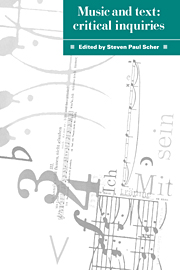Book contents
- Frontmatter
- Contents
- List of figures
- List of contributors
- Preface
- Acknowledgments
- Part I Institutional dimensions and the contexts of listening
- 1 Music and literature: the institutional dimensions
- 2 Privileging the moment of reception: music and radio in South Africa
- 3 Chord and discourse: listening through the written word
- Part II Literary models for musical understanding: music, lyric, narrative, and metaphor
- Part III Representation, analysis, and semiotics
- Part IV Gender and convention
- Index
2 - Privileging the moment of reception: music and radio in South Africa
Published online by Cambridge University Press: 04 September 2009
- Frontmatter
- Contents
- List of figures
- List of contributors
- Preface
- Acknowledgments
- Part I Institutional dimensions and the contexts of listening
- 1 Music and literature: the institutional dimensions
- 2 Privileging the moment of reception: music and radio in South Africa
- 3 Chord and discourse: listening through the written word
- Part II Literary models for musical understanding: music, lyric, narrative, and metaphor
- Part III Representation, analysis, and semiotics
- Part IV Gender and convention
- Index
Summary
Joseph Kerman observed in 1985 that “semiotics, hermeneutics, and phenomenology are being drawn upon only by some of the boldest of musical studies today, [and] post-structuralism, deconstruction, and serious feminism have yet to make their debuts in musicology.” As accurate as this statement may have been then for mainstream historical musicology in the United States, it was not applicable to the study of popular music, which was marked throughout the 1980s by attempts to apply these and other recent theories and methodologies to musical scholarship, largely through the agencies of the International Association for the Study of Popular Music (IASPM), established in 1981 during a first International Conference on Popular Music Research held in Amsterdam, and the journal Popular Music, published by Cambridge University Press since 1981.
Music exists as a three-fold series of processes: a first stage of creation, or composition; a middle stage of mediation, involving publication, production, performance, and dissemination; and a final one of reception and perception. Historical musicologists, particularly in the United States, with their propensity for accumulating “more and more facts, [with] less and less confidence in interpreting them,” as Kerman put it, have tended to privilege the first of these processes to the virtual exclusion of the others, while scholars of the mass media and certain social scientists focus their attention on the second.
- Type
- Chapter
- Information
- Music and TextCritical Inquiries, pp. 21 - 37Publisher: Cambridge University PressPrint publication year: 1992
- 2
- Cited by



